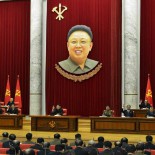Jang-O Competition for Foreign Geetis

NDC Vice Chairman and CC KWP Operations Department Director, Gen. O Kuk Ryol, is 2nd R in the 1st Row at the 3rd plenum of the 12th SPA on 7 June 2010. NDC Vice Chairman and CC KWP Administration Director Jang Song Taek is 3rd R in the 2nd Row.
Two KJI confidantes and National Defense Commission Vice Chairmen, Jang Song Taek and Gen. O Kuk Ryol, are rumored to be competing to earn the most foreign investment for North Korea through their respective international trading corporations. Gen. O exploited his promotion to NDC Vice Chairman in 2009 to form a foreign trading corporation, and “expand his influence in attracting foreign capital.” Mr. Jang’s 7 June 2010 promotion to NDC Vice Chairman was preceded by the formation of a state development bank and the promotion of the Korea Taepung International Investment Group.
JoongAng Ilbo‘s Lee Young-jong reports:
O and his aides established Choson Kukje Sanghoe (Korean International Trading Company) as the organization solely responsible for foreign investment promotion and received approval for the organization from the presidium of the Supreme People’s Assembly on July 1, 2009.
Meanwhile, Jang named Park Chol-su, a Korean-Chinese businessman, president of Korea Taepung International Investment Group, which he re-purposed to attract foreign investment.
The company initially belonged to the cabinet, but Jang absorbed it into the National Defense Commission and announced the establishment of the re-purposed company in a January 20 report from the official Korea Central News Agency. The news report said Kim Jong-il issued an “order” that the state guarantee that Taepung be able to attract foreign investment.
“O Kuk-ryol is very displeased that Jang jumped into the foreign investment business that he led,” said the sources. “Currently, Choson Kukje Sanghoe and Korea Taepung International Investment Group are vying against one another.”
The sources said that the power struggle is already being watched with concern by the State Security Department, the North’s supreme intelligence agency.
The agency, the sources said, suspects that China is behind Taepung and is trying to control the North Korean economy by injecting capital through Park and the group. The sources said the agency is hesitant to report its suspicions to Kim, given his close relationship to Jang.
Jang has cultivated power through economic projects Kim has entrusted him with, such as a project to build 100,000 houses in Pyongyang. Since he was promoted to vice chairman last month by Kim, he is thought to have increased his political clout as well.
Ri Je-kang, a rival with Jang, also died in a mysterious, recent traffic accident.
Rumors of a Jang-O conflict surfaced when Jang was moved up to NDC Vice Chair in June. Two divergent narratives emerged. One put O Kuk Ryol in the driver’s seat, head of ruling group of 4 KJI subordinates and included “rumors that O has assumed part of Kim’s jobs of signing and approving official documents as Kim has difficulties taking care of them.” Another report, carried by JoongAng, found O Kuk Ryol politically “neutralized” and Jang ruling in cooperation with the KPA.
The question circumscribing O Kuk Ryol’s role in the leadership culture is whether the consolidation of the country’s intelligence agencies under the NDC Reconnaissance Bureau bureaucratically shackled him (the CC KWP Operations Department of which Gen. O is director is now part of the NDC RB), or if the consolidation is the political platform from which O derives his power. One note (which may have appeared before) about the Taepung International Investment Group; prior to being “repurposed” Taepung sold fuel to the KPA and agencies subordinate to the NDC and CC KWP.

NDC Vice Chairmen Jang Song Taek (3rd R) shares a hearty laugh with his brother-in-law, Kim Jong Il, and their entourage from the renamed Ministry of People's Security and Korean People's Interior Forces during a June, 2010, guidance tour of the Taedong River Combined Fruit Farm in Samsok District, Pyongyang. It is likely this KJI visit occurred shortly after the 2 June 2010 car accident death of Senior Deputy (Vice) OGD Director, Ri Je Gang. (Photo: KCNA)

